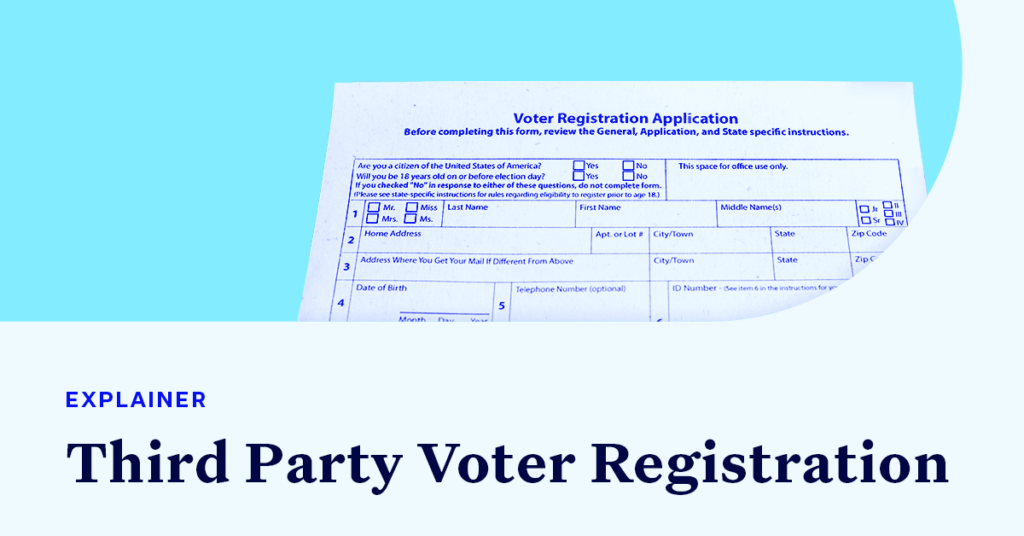How Third-Party Organizations Conduct Voter Registration

In the 2020 election, President Joe Biden received seven million more votes than former President Donald Trump. But because of the Electoral College, less than 45,000 votes in three crucial states secured him the presidency.
These figures — 45,000 and even, seven million — are easily surpassed by the number of people who did not vote at all. Over a quarter of all voting age Americans — around 63 million people — are not registered to vote.
In today’s Explainer, we look into the organizations that work to engage these potential voters. Third-party voter registration organizations (3PVROs) are already governed by several state and federal laws, but have seen an uptick in new restrictions designed to hinder their efforts.
What do third-party voter registration organizations do?
Twenty two states and Washington, D.C. have automatic voter registration, where residents are registered to vote when they interact with certain governmental agencies, such as getting or updating a license at the Department of Motor Vehicles or enrolling in a program with the Departments of Health. If someone doesn’t interact with a designated agency or if they live in one of the other 28 states, the onus to register to vote falls onto the individual. That’s where third-party organizations come in — filling in the gap where the state has failed to engage potential voters.
Third-party voter registration groups can look different from one another. Any 501(c)(3) organization (a common type of charitable or nonprofit organization) can conduct voter registration and get-out-the-vote efforts if run in a nonpartisan manner. Pro-democracy organizations that engage in issue area advocacy, such as the League of Women Voters, can also maintain nonpartisan branches focused on voter education and registration.
Other groups emerged when the moment demanded mobilization — in 1990, Rock the Vote was founded by a group of music executives concerned over the censorship of hip-hop and rap artists and in 2018, Michelle Obama (and a host of other celebrities) launched When We All Vote.
In addition to in-person voter registration efforts, a significant portion of these organizations concentrate on digital resources aimed at registration, mail-in voting and more.
How do states govern voter registration activities?
Federal law prohibits any individual or organization from offering financial incentives to register to vote. Beyond that, states can enact their own guidelines for voter registration activities, resulting in a wide variety of laws across the country.
It is common for states to regulate in the following ways:
- Requiring certain types of training for those conducting voter registration;
- Requiring pre-registration with the state in advance of voter registration drives and reports delivered to the state afterwards;
- Limiting certain types of compensation for 3PVROs employees conducting registration;
- And imposing deadlines when returning voter’s applications.
Let’s take a look at what these laws can look like in practice in arguably the most restrictive state for voter registration: Texas.
Prior to passage of the National Voter Registration Act in 1993, states often designated the voter registration process to “deputy registrars,” individuals who had to sign up with the state before registering voters. This tightly-controlled process occasionally gave room for abuse of power. Today, Texas is the only state where an official volunteer system is still mandatory. If an individual wants to help register voters, they must first register as a volunteer deputy registrar (VDR) and complete a training developed by the secretary of state’s office.
In Texas, the return deadline is five days — VDRs must deliver completed registration applications by 5:00 p.m. on the fifth day after they are received. Additionally, it is illegal to give a quota or compensate based on how many registrations a canvasser collects.
State-specific guidelines, as of July 2021, can be found here.
There’s been an increase in new laws limiting the work of voter registration organizations.
Within a larger trend of criminalizing the voting process, Republican lawmakers have added new administrative hurdles for 3PVROs to overcome. And if they don’t comply, these groups face fines and in some cases, criminal liability.
In 2021, Florida passed a voter suppression law which required 3PVROs to verbally tell applicants they “might not deliver” their form on time — even if the organizations have every intent and ability to do so. This disclaimer requirement was struck down in court for violating the First Amendment and removed by the Legislature in a new bill that Gov. Ron DeSantis (R) signed into law on Monday. Now, instead of a verbal requirement, the disclaimer must be written on the registration application.
While this change is welcome, the new law, among many other voting restrictions, dramatically increases the maximum fines that can be levied against organizations that make mistakes on registration forms or mail-in ballot applications. 3PVROs have similarly become the target of new laws in Texas and Kansas. In Kansas, voting rights groups were forced to halt their efforts completely.
3PVROs play a crucial role within the country’s election ecosystem; we are keeping a close eye on legislation that undermines these efforts to engage new voters and bring them into the democratic process.